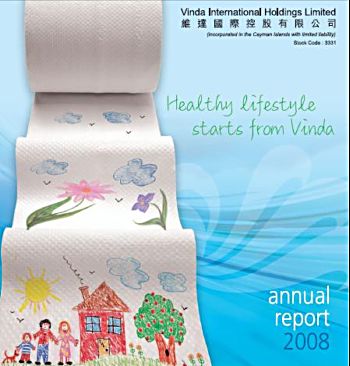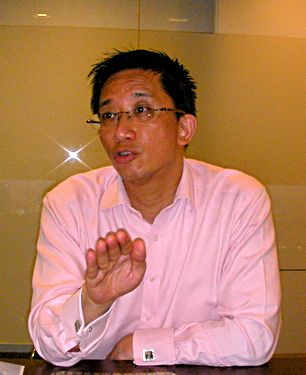
Vinda's revenue rose 36.4% to HK$2.42 billion last year. Net profit more than doubled to nearly HK$166 m
YEAR 2008 was not friendly to most Chinese firms, given the deadly winter weather that crippled much of the country in February, the earthquake that shook the southwest in May, and the economic stutter-stall that rocked the world around the time that Beijing was bidding farewell to the Olympics in August.
But Paul Tsang, Vinda’s CFO, told NextInsight in an interview that the company – which sells 86% of its output in China, another 12% in Hong Kong, and only 2% elsewhere -- was not like most other Chinese firms in several respects.
For one, its virtual lack of exposure to moribund external demand was a benefit.
“In early 2008, we were cautious as two natural disasters happened. But down the road, we managed risks and passed on increasing costs by raising selling prices. Our management is very capable. And our brand name is our biggest intangible asset,” Mr. Tsang said.
When asked if Vinda’s two main product categories – toilet rolls and facial tissue – were one of the closest things in the market to “recession proof” goods due to their “indispensability” in both good times and bad, he smiled as though anticipating the question.
“Yes, our products are seen as staple products of sorts, and with a strong brand, so therefore, yes they (do enjoy) recession proof (qualities). Human nature is such that it’s hard to go back on these personal use items,” he said.
Mr. Tsang said that consumers seldom opt for a slightly cheaper no-name brand of tissues or toilet rolls just to save “a couple of yuan.”
“Most of our competitors compete only on price, because that’s all they have. Our competitors hold out to see what Vinda does as we raise prices,” he said.
Vinda was also eyeing the benefits of urbanization and more modern city life as a strong driver of our business,” Mr. Tsang said.
He also said that the Chinese government’s clamping down on small, inefficient, less environmentally-savvy producers was addition-by-subtraction for Vinda.
“This is a consolidation opportunity for us as they leave the market.” Despite raising selling prices last year by 13.3% to 12,645 hkd/tonne, Vinda still managed to raise its gross profit margin to 21.2% thanks in part to what it called a “successful pricing strategy.”
Last year, Vinda’s revenue rose an impressive 36.4% to 2.42 bln hkd, with profit attributable to shareholders more than doubling to nearly 166 mln.

Paul Tsang, CFO of Vinda. Photo by Andrew van Buren
Rolling, rolling, rolling…
Last year, Vinda sold a market-leading 1.51 bln hkd in toilet rolls, up 39.8% year-on-year, which constituted 62.1% of its overall product mix (compared with 60.6% in 2007).
Vinda would not try to fix that which isn’t broken, and therefore plans to continue to keep toilet rolls its focal product for the foreseeable future.
“Nationwide, toilet rolls constitute 80% of the entire personal-use paper industry’s sales. We are at 62%, and will continue to focus on toilet rolls. We have strength in toilet roll papermaking. We are also trying to popularize the use of paper towels in Chinese kitchens,” he said, referring to a product ubiquitous in Western kitchens.
He said marketing paper towels as a much healthier and safer option was a key to successful acceptance in China.
“Regular cloth towels are dirty, they’re bacteria traps. We also want to expand our brand strength to wet tissues. But we won’t let go of our core strength -- toilet rolls. Tissues and toilet rolls will be key revenue drivers in 2009.”
Mr. Tsang, who began his career at accounting firm Arthur Anderson, then became involved in REIT restructuring and has now been with Vinda for two years, said the company has “benefited greatly” from its official sponsorship of China’s national women’s volleyball team, but was not content to stop there.
“We may look at more with the NBA if we think it is effective, including advertising at US game venues during broadcasts,” he said, while passing around Vinda tissue boxes embossed with NBA logos for our inspection.
No pulp fiction here
The company’s chief raw material is virgin wood pulp, and fluctuations in its cost can have a drastic effect on papermakers’ financial performance. Luckily for Vinda, its leading market size carries more than a few perks in the input pricing game.
“We have been a major player in the pulp-buying market for a long time. All the big pulp suppliers have volume commitments with us, and because of our market-leading size, we get considerable discounts,” Mr. Tsang said.
He added that global pulp prices fell “very abruptly” in the fourth quarter of 2008, which presented excellent buying opportunities for Vinda.
“A lot of our competitors abandoned Q4 shipments at ports, but we didn’t, which allowed us to buy (abandoned pulp orders) at fire sale prices, and we got the biggest discounts.”
He said most of Vinda’s coniferous/long fiber pulp comes from Canada and Russia where it is bound for harder, less flexible, durable personal-use paper end-products, while Indonesia and Brazil are its chief suppliers of short fiber pulp which finds its way into softer facial tissues.
Tsang said Vinda doesn’t waste much time when it decides to boost capacity. “It took us only 8 months to build a 40,000 ton plant in Zhejiang province. But we don’t always insist on greenfield (production) anymore. We also sometimes look to OEMs. We are particularly strong in cost controls.”
As an example, he pointed to one recent example of Vinda’s spending money to save a lot more down the road.
“We installed an electronic weighing system along our whole production line to ensure we are over minimum weight. It also helps limit overage.”
He said that while Vinda was No.1 in China, it was not without its rivals. “Wuyuehua (五月花) is decent competition for us in the PRC.”
Finally, he said that the company was not planning any imminent second listings after first selling shares in Hong Kong beginning in 2007.
“Down the road, our next listing if any would likely be in Shanghai,” Mr. Tsang said.

